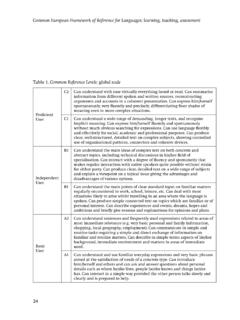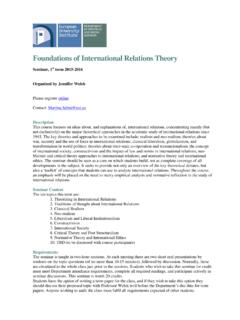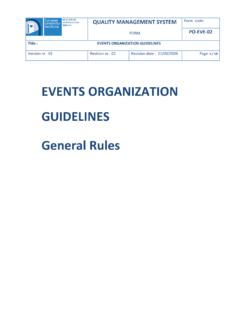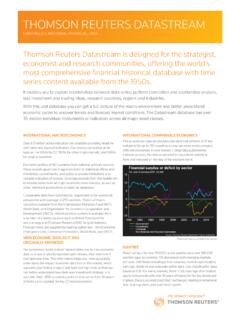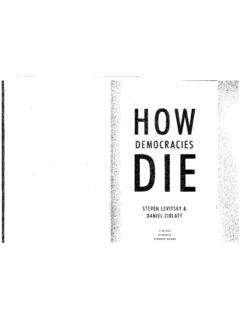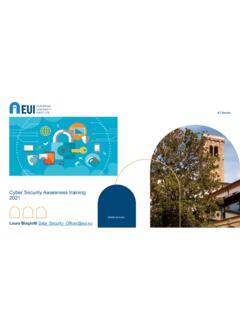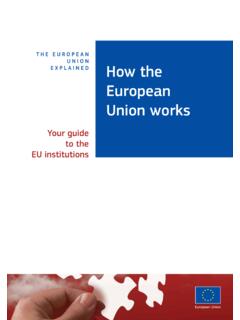Transcription of The Role of the European Union in the World
1 No. 22 The Role of the European Union in the World Eneko Landaburu INTRODUCTION In recent years, preoccupied by the debt crisis, the fragility of its financial institutions, the fight it wages for growth and against unemployment, and the rise of populism, the European Union (EU) failed to strengthen, let alone increase its influence and presence on the international stage. Therefore, a couple of weeks before European citizens are called to exercise their great democratic right to elect a new European Parliament, the big question is this: in light of harsh realities and past failures, what can reasonably be done by the next Parliament to make significant progress with the Union s foreign policy? THE DECLINE OF EUROPE The reasons of this decline are no secret. However, the degradation of its economic impact relative to the significant growth of emerging markets should be mentioned.
2 These emerging markets used market capitalism bolstered by information technologies to create economic and social development of exceptional speed and scope, thus greatly reducing poverty. 2 It did not take long for a complete reshuffle of global geopolitics to follow. Europe, having lost much of its former technological upper hand and having to bear the high cost of its social model, is clearly losing a lot of its competitiveness on global markets. It no longer is a matter of strengthening the EU s place in the World , but a question of restoring it. To that end, the consolidation of the single currency would be the place to start because the euro s equivalence to the deutschemark has allowed it to keep its credibility. To make its voice heard, the EU s only alternative is to prioritise the exit from the financial, economic and social crisis and to consolidate the single currency.
3 Succeeding at both these tasks requires greater political integration, and an increase in shared monetary, economic, fiscal and social sovereignty also calls for stronger democratic legitimacy within the EU. A lot of hope was placed in the political role and influence of the EU in the World when the Maastricht treaty was signed, because it institutionalised the Common Foreign and Security Policy (CFSP). This treaty was a political statement in answer to the upheaval of the European continent: the fall of the Soviet Union , the democratisation of Eastern and Central European countries, of the Balkans, and the German reunification to mention only the main events : it revealed just how much appeal was generated by a forward-thinking Europe. This treaty established specific objectives for the EU s foreign policy and served as a base for the gradual improvement of these objectives until the Lisbon treaty , which brought together all of the EU s external action objectives under Art.
4 21. For example, we should mention: Safekeeping the EU s values, fundamentalinterests, safety, independence, and integrity; Consolidating and upholding democracy, therule of law, human rights and the principlesof international law; Preserving the peace, preventing conflictsand strengthening international a big undertaking!These three objectives bear testimony to the very high hopes placed in the EU by its Members States. It seems obvious that 20 years later, the results are few and far between, and a far cry from what had been announced. It s true that the Common Foreign and Security Policy (CFSP) was created at the dawn of the violent uprisings that would be characteristic of the post-Cold War era: ethnic cleansing in ex-Yugoslavia, the Rwandan genocide, the reprisal of Israeli-Palestinian hostilities on top of the 9/11 terrorist attacks, the Iraq war, and more recently the wars in Libya, Syria and Mali.
5 In all of these conflicts, the EU most often proved itself powerless, absent, or spectacularly divided as was the case over Iraq or the military operations in Libya. This track record is clearly a negative one, and above all it reveals the disagreements between Member States over the needs, aims and content of a foreign policy for the EU. It also reveals the Europeans predilection for institutional commitment and convoluted flow charts, for legal subtleties with no operational impact like constructive abstention, and for diplomatic interventions made of sweeping, high-flying statements illustrated by the numerous common positions that emerge from the Council of the EU as well as innumerable conclusions about major international crises originating from European Councils. The main lesson to be learned here is that the objectives set out in the Treaties cannot be met because of three reasons: the insufficiency of the operational capabilities of both the Union and its Members States, the predominance of the 3 intergovernmental procedure, and the cumbersome decision-taking procedures.
6 Therefore, there is a real possibility that the EU will be marginalised on the international stage, where only the main Member States could hope to remain at the forefront; but even then, for how long? EXISTING STRENGTHS Despite this loss of economic and political influence, there is no denying that the EU possesses a wide array of strengths to play a definite role in World affairs. The first thing to consider is that the EU derives its visibility and influence on the World stage from its unity on subjects such as its trade policy, competition policy, and the standards it sets for the World s largest market. As the first economic power for some time yet, it also has the World s second leading currency and spreads over lands that hold 500 million citizens who benefit from high living standards and a social model sought after throughout the World .
7 Demographically, the European population is ageing and stagnating, but in this it is not alone. In 2050, the EU will still be more populated than the US, remaining in the third place of global rankings behind India and China. The EU attracts significant migratory flows, and is the main source and destination of tourists in the World . As member of both the G8 and G20, the EU is the largest donor of development aid in the World and has imposed itself as a key player in the development of the south. The consensus on cooperation commits Member States to a common set of values and principles. In addition to this, it also has one of the World s most efficient humanitarian intervention departments in the Humanitarian Aid and Civil Protection department of the EC. Last but not least, the EU is a powerful and influential source of cultural innovation and creation.
8 It is seen by a large slice of humanity as a model of democracy, stability, and solidarity. AVAILABLE INSTRUMENTS These are undeniable facts, but the EU is equipped with a set of tools to act on the World stage that is far from negligible and that only needs to be put to better use. Its external relations policy instruments are among its most notable. For a number of years now, this policy implemented by the Commission has enabled the development of economic relations thanks to hundreds of international agreements, and it has secured the reliable and influential presence of the EU in a great number of countries. Supported by its 140 or so delegations in the World s capitals and largest international organisations, it has a steady and definite global presence with its multiple common policies. We already mentioned two of these, both essential: its trade policy and its development aid policy.
9 We should also mention the external dimensions of the environment, agriculture and fisheries, transport, energy, research and development, and migration policies. With the Lisbon treaty , these delegations went from being delegations of the European Commission to being delegations of the European Union , and gained additional foreign policy responsibilities under the authority of the new European External Action Service and the High Representative/Vice-president of the Commission. This is an active administration that implements the international agreements at the core of European diplomacy. As the sole representatives of the EU, these heads of 4 delegation have gained in visibility and efficiency. In the toolbox at the EU s disposal can also be found a number of instruments and prerogatives of the CFSP and the CSDP that were added between the Maastricht treaty and the Lisbon treaty , and that are just waiting to be put to better use.
10 On the basis of these treaties, a number of improvements took place. This does not purport to be an exhaustive list, but the following are worth mentioning as examples: the Berlin Plus agreement, and the 1999 Washington NATO Summit that put NATO means and capabilities at the disposal of the EU, notably for the planning of operations in which the Alliance does not involve itself (ALTHEA Operation in Bosnia, 2009). Let us also recall the decisions of the December 1999 Helsinki European Council that made the deployment of military forces numbering between and people possible. The ambition was high: giving the Union the means to remain on the field for as long as necessary. Although this project has not been implemented, it is good that it exists. Finally, let us evoke the Lisbon treaty , which enables the Council to entrust an operation to a group of Member States that have the required means to act.

